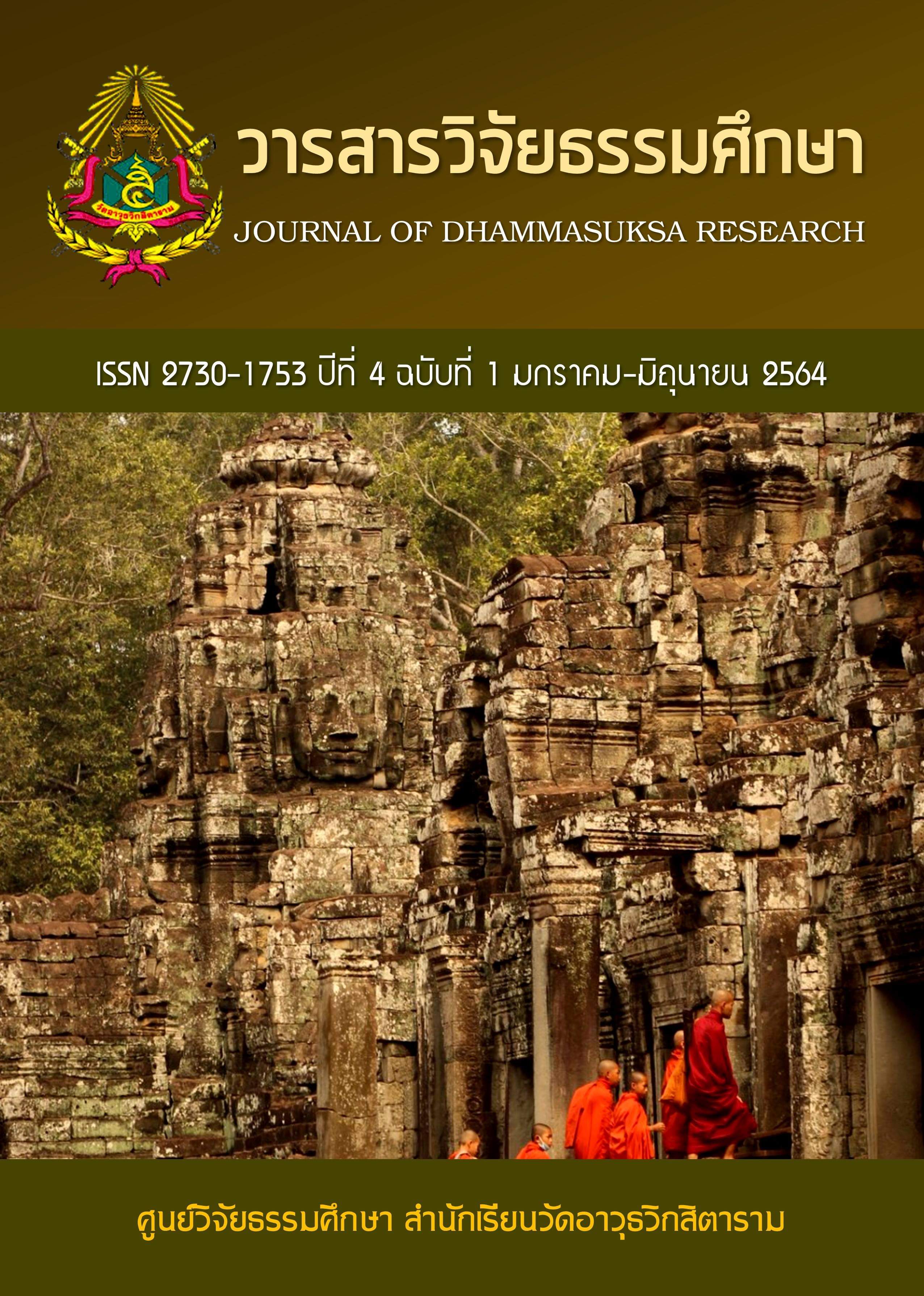An Analytical Study of the Buddha?s Pedagogical Psychology in Theravada Buddhist Philosophy
Keywords:
The teaching of psychology, psychologists, the Buddha?s Pedagogical PsychologyAbstract
Thematic Study on the An Analytical Study of The Buddha?s Pedagogical Psychology in Theravada Buddhist Philosophy. The three main objectives. 1) To investigate the psychology of teaching in a general comment. 2) To investigate the Buddha?s Pedagogical Psychology in Theravada Buddhist philosophy. 3) To analysis of the Buddha?s Pedagogical Psychology in the Theravada Buddhist philosophy. The research was conducted by the qualitative method. Data were collected out of Tipitaka Canons and relevant academic writings on Buddhism and Psychology belonging to scholars in those fields and were academically accepted in general. Subsequently, they were analyzed through advisors? suggestions, summed up and presented by the descriptive analysis.
The analytical study's result were found as follows:
1) The teaching of psychology, philosophers and psychologists have developed many of the individual. Periods of social change to. Psychologists would have a point in the psychology of teaching is not the same, Psychologists have a concept that is focused on their research. The concept was born out of many different groups of psychologists. Some psychologists have focused on idealism. The group will focus on behaviorism. And some of the factors in the environment for learning. Although each group has different guidelines, but the aim is to understand the behavior of individual learning and behavior can be learned to achieve the desirable features. 2) The Buddha?s Pedagogical Psychology in Theravada Buddhist Philosophy the patterns and practices of the past, but traditionally have not changed. However, the depth and coverage in several areas. Even though it will last much longer. However, the depth and coverage in several areas. This is the style of teaching is different nature. It also discusses the subject of the sixth behavior to have a role in determining the suitability of the subject to be taught that the behavior of the audience or not. The story of the teachings about Nwanga-sattusasana. The style of teaching, which is defined as a step by step easy to understand and share a variety of levels, but those who listen to a sermon. It can be applied to modern society as well. 3) The Buddha?s Pedagogical Psychology in Theravada Buddhist Philosophy. It can also be adapted for use in today's society as well. Although the teaching of psychology, psychologists will be adjusted according to age. But it is not enough to implement the teaching of modern society.? The study found that Teaching in the current course. Not sufficient to enhance the learning of the child to meet the objectives as they should. The study of Buddhist doctrine, it was found that the models and methods to be used to enhance the performance of teachers especially. The various methods. The Psychology of Buddhist teaching is the way to a style of teaching does not focus on how to teach what I teach. But look at how the Buddha taught that. The primary method of learning how. The individual should be taught how to do the trick, however.
References
การศาสนา, กระทรวงศึกษาธิการ, กรม. (2525). พระไตรปิฎกภาษาไทย ฉบับหลวง. กรุงเทพฯ : โรงพิมพ์มหามกุฏราชวิทยาลัย.
จิตรา วสุวาณิช. รศ.. (2533). จิตวิทยาการศึกษา. กรุงเทพฯ : โรงพิมพ์สำนักพิมพ์มหาวิทยาลัยรามคำแหง.
ชูศักดิ์ ทิพย์เกสร. (2540). พระพุทธเจ้าสอนอะไร. กรุงเทพ : โรงพิมพ์มหาจุฬาลงกรณราชวิทยาลัย.
เดือน คำดี. รศ.. ดร.. (2534). พุทธปรัชญา. กรุงเทพฯ : โรงพิมพ์ โอ.เอส.พริ้นติ้ง เฮ้าส์.
ธรรมปิฎก. (ป. อ. ปยุตฺโต) พระ. (2538). พจนานุกรมพุทธศาสน์ ฉบับประมวลธรรม. กรุงเทพฯ : โรงพิมพ์มหาจุฬาลงกรณราชวิทยาลัย.
ธรรมปิฎก. (ป. อ. ปยุตฺโต) พระ. (2546). พจนานุกรมพุทธศาสน์ ฉบับประมวลศัพท์. กรุงเทพฯ : โรงพิมพ์มหาจุฬาลงราชวิทยาลัย.
ธรรมปิฎก. (ป. อ. ปยุตฺโต) พระ. (2546). พุทธธรรม. กรุงเทพฯ : โรงพิมพ์มหาจุฬาลงกรณราชวิทยาลัย.
บรรจบ บรรณรุจิ. (2537). อสีติมหาสาวก. กรุงเทพ : โรงพิมพ์มหาจุฬาลงกรณราชวิทยาลัย.
บุญมี แท่นแก้ว. ผศ.. (2545). จริยศาสตร์ (ETHICS). กรุงเทพฯ : สำนักพิมพ์ โอ.เอส. พริ้นติ้ง เฮาส์.
พรหมคุณาภรณ์. (ป. อ. ปยุตฺโต) พระ. (2551). พุทธวิธีในการสอน. กรุงเทพฯ : บริษัท สหมิตรพริ้นติ้ง แอนด์พับลิสซิ่ง จำกัด.
พุทธทาสภิกขุ. (พระธรรมโกศาจารย์) พระ. (2538). มรดกธรรม. กรุงเทพฯ : สำนักพิมพ์ธรรมสภา.
ราชบัณฑิตยสถาน. (2531). พจนานุกรม ฉบับราชบัณฑิตยสถาน พ.ศ.2525. กรุงเทพฯ : โรงพิมพ์อักษรเจริญทัศน์.
สมเด็จพระวันรัต. (จับ ฐิตธัมมเถระ). (2539) พุทธวิธีทรงฝึกเวไนยชน. อนุสรณ์เนื่องในงานพิธีพระราชทานเพลิงศพสมเด็จพระวันรัต, กรุงเทพ : ห้างหุ้นส่วนจำกัดชวนพิมพ์.
สมัคร บุราวาศ. (2552). พุทธปรัชญา : มองพุทธศาสนาด้วยทรรศนะทางวิทยาศาสตร์. กรุงเทพฯ : โรงพิมพ์ศยาม.
สมัคร บุราวาศ. (2554). จิตวิทยาและการทำใจ. กรุงเทพฯ : โรงพิมพ์ศยาม.
สุชีพ ปุญญานุภาพ. (2541). พระไตรปิฎกฉบับประชาชน. กรุงเทพฯ : โรงพิมพ์มหามกุฏราชวิทยาลัย.
สุรีย์ มีผลกิจ. (2543). พระพุทธกิจ 45 พรรษา. กรุงเทพ : บริษัท คอมฟอร์ม จำกัด.
แสง จันทร์งาม. (2511). พุทธศาสนากับสังคมไทย. กรุงเทพฯ : โรงพิมพ์มหามกุฏราชวิทยาลัย.
ศิริบูรณ์ สายโกสุม. รศ. ดร.. (2542). จิตวิทยาการศึกษา. กรุงเทพฯ : โรงพิมพ์สำนักพิมพ์มหาวิทยาลัยรามคำแหง.
วศิน อินทสระ. (2542). พุทธปฏิภาณ. กรุงเทพฯ : สำนักพิมพ์ธรรมกิตติ.
นภดล เจนอักษร. (2526). การศึกษาวิธีสอนของพระพุทธเจ้า. ปริญญานิพนธ์ศิลปศาสตรมหาบัณฑิต. บัณฑิตวิทยาลัย : มหาวิทยาลัยศรีนครินทรวิโรฒ มหาสารคาม.
แหวนทอง บุญญาคโม (บุญคำ). พระมหา. (2534). วิธีการสอนของพระพุทธเจ้าตามที่ปรากฏในพระสูตร และพระวินัย. วิทยานิพนธ์ศาสนศาสตรมหาบัณฑิต. บัณฑิตวิทยาลัย : มหาวิทยาลัยมหามกุฏราชวิทยาลัย.
ทวี มหาปญฺโญ (ละลง). พระมหา. (2545). การศึกษาเชิงวิเคราะห์พุทธวิธีการสอนในธัมมปทัฏฐกถา. วิทยานิพนธ์ศาสนศาสตรมหาบัณฑิต. บัณฑิตวิทยาลัย : มหาวิทยาลัยมหามกุฏราชวิทยาลัย.
Connaughton. Patrick A.. (2009). An Introduction to ancient Western Philosophy. Nakorn Pathom : Academic Promotion and Development Center Saengtham college.

Downloads
Published
How to Cite
Issue
Section
Categories
License
Copyright (c) 2021 Journal of Dhammasuksa Research

This work is licensed under a Creative Commons Attribution-NonCommercial-NoDerivatives 4.0 International License.


